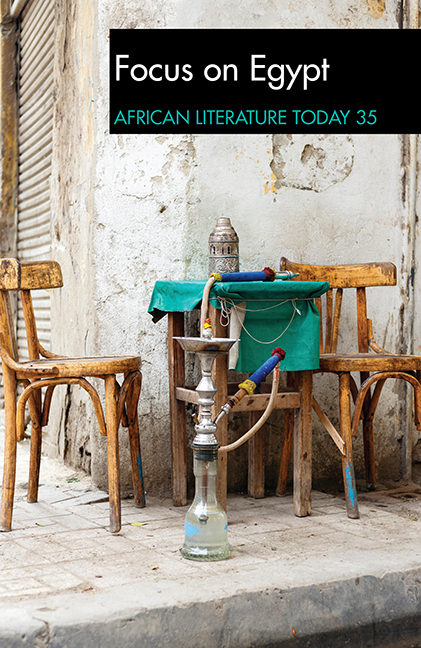Book contents
- Frontmatter
- Dedication
- Contents
- Notes on Contributors
- Foreword
- EDITORIAL ARTICLE
- ARTICLES
- FEATURED ARTICLES
- LITERARY SUPPLEMENT
- TRIBUTE
- REVIEWS
- Mohammad Rabie, Otared. Translated from Arabic By Robin Moger
- Yasser Abdel Hafez, The Book of Safety. Translated from Arabic to English by Robin Moger
- Sanya Osha, On A Sad Weather-Beaten Couch
- Adam Mayer, Naija Marxism: Revolutionary Thought in Nigeria
- NoViolet Bulawayo, We Need New Names
- Okey Ndibe, Never Look An American in the Eye: Flying Turtles, Colonial Ghosts, and the Making of a Nigerian American
- Reviews of Nigerian Poetry
Adam Mayer, NaijaMarxism: Revolutionary Thought inNigeria
from REVIEWS
Published online by Cambridge University Press: 24 August 2019
- Frontmatter
- Dedication
- Contents
- Notes on Contributors
- Foreword
- EDITORIAL ARTICLE
- ARTICLES
- FEATURED ARTICLES
- LITERARY SUPPLEMENT
- TRIBUTE
- REVIEWS
- Mohammad Rabie, Otared. Translated from Arabic By Robin Moger
- Yasser Abdel Hafez, The Book of Safety. Translated from Arabic to English by Robin Moger
- Sanya Osha, On A Sad Weather-Beaten Couch
- Adam Mayer, Naija Marxism: Revolutionary Thought in Nigeria
- NoViolet Bulawayo, We Need New Names
- Okey Ndibe, Never Look An American in the Eye: Flying Turtles, Colonial Ghosts, and the Making of a Nigerian American
- Reviews of Nigerian Poetry
Summary
In 2005, theNational Intelligence Council of the US publishedpredictions that African countries, especially Nigeria,would disintegrate by the year 2015. Edwin Madunagu calledthat ‘wishful thinking’ in his column for TheGuardian and theorized that the Nigerian statewas still strong enough to withstand disintegrationpressures. In 2010, the former US Ambassador to Nigeria,John Campbell, followed up with a book that called Nigeria a‘bastard child of colonialism’ and said that the country was‘Dancing on the Brink’ of collapse unless resources weremade available to fight poverty in the Northeast, withoutmentioning the lack of educational opportunities as a majorcause of poverty. Why did Nigeria manage to survive thepredicted collapse in 2015?
NaijaMarxisms by Adam Mayer reads like anintelligence report of the sort that British colonialadministrators commissioned from 200 colonialanthropologists, following the Women's War of 1929, tofigure out why the Igbo were difficult to subject tocolonial rule. Mayer is obviously aware of this implicitmeaning of his book because he cited Ikenna Nzimiro (110) onthis point as if pre-empting any suspicions that he wasconducting counter-insurgency style surveillance on thestate of revolutionary thought in Nigeria today. Thesuspicion that the book is, knowingly or unknowingly, a spystory was raised in the preliminary pages where the authorthanked one of his doctoral thesis advisers, a ‘ProfessorColonel’ in Hungary, for pointing him in the direction ofthe security implications of his topic. The suspicion wasthickened by the fact that the author used the assertions ofJohn Campbell as the theoretical framework for the book frombeginning to end. Campbell is positioned by the author asthe ‘foremost expert on Nigeria’ and his prediction that‘Nigeria may well produce a Fidel Castro’ is the‘problematique’ that the Hungarian author tried toinvestigate with the admission that the emergence of aCastro in Nigeria would be ‘a very unwelcome idea’ from thepoint of view of the US (3).
In answer tothe security query raised by Campbell, the author observedthat ‘… there was no violent Marxist group in Nigeria thatwould have advocated terrorist methods, nor do we find anyNigerian Marxist thinkers who embraced left communism andits theories’ (37).
- Type
- Chapter
- Information
- ALT 35: Focus on EgyptAfrican Literature Today 35, pp. 293 - 302Publisher: Boydell & BrewerPrint publication year: 2017

